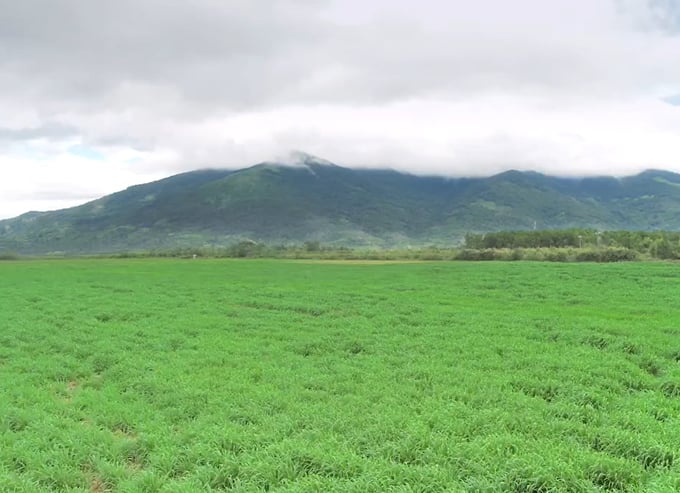November 27, 2025 | 22:01 GMT +7
November 27, 2025 | 22:01 GMT +7
Hotline: 0913.378.918
November 27, 2025 | 22:01 GMT +7
Hotline: 0913.378.918

A grass field serves as food for dairy cows in Mang Yang. Photo: Son Trang.
At the seminar "Building Mang Yang - Gia Lai into a Paradise for Dairy Cows" organized by Young People's Newspaper on April 16, the organizers stated that located at an altitude of about 800m above sea level, Mang Yang has a cool climate, a relatively dense river system, evenly distributed throughout the area. These are ideal conditions for developing dairy herds with excellent quality.
Mr Tran Bao Minh, Vice Chairman of Nutifood's Board of Directors, also stated that Mang Yang has many favourable conditions for developing dairy cattle farming, such as a cool climate, fresh air, and clean water. The cool climate helps dairy cows grow well, with high milk productivity. Clean air and water help ensure that the milk produced in Mang Yang has high protein and fat content and is very clean.
Thanks to Mang Yang's favourable natural conditions, combined with investments in barns, technology, and especially breeding, after 4 years of operation, the dairy cows at Nutimilk farm of Nutifood have achieved very high milk productivity, with some cows producing up to 40 litres of milk per day. Currently, Nutifood has invested in a dairy farm with a scale of 12,000 cows and a large milk processing plant in Mang Yang.
Mr Tran Quoc Trung, Chairman of the Vietnam Dairy Association, assessed that the combination of a pure natural environment, high-yield dairy cattle breeds, and modern production technology will provide Vietnamese consumers with abundant and high-quality fresh milk.
It can be seen that typical fresh milk at Nutimilk dairy farm in Mang Yang has reached 3.5 grams of protein per 100ml of milk, with a yield of 35 litres per cow per day, equivalent in quality and yield to large dairy farming countries in the world.
According to Mr Le Trong, Chairman of the People's Committee of Mang Yang district, Nutifood's dairy farm in Mang Yang has truly changed and become a focal point for the district's livestock industry, spreading to neighbouring areas. The farm also helps many people have higher and more stable incomes when switching to grass and corn cultivation to supply materials for the farm.
Given the potential for dairy cattle farming development in Mang Yang, Mr Nguyen Tuan Anh, Vice Chairman of Gia Lai Provincial People's Committee, expressed his desire for investors like Nutifood to expand production and supply chains.
Supporting the development of dairy cattle farming in Mang Yang, Dr Nguyen Xuan Duong, Chairman of the Animal Husbandry Association of Vietnam, suggested that Gia Lai province review its planning for dairy cattle farming development in the area. At the same time, Gia Lai province needs policies to encourage businesses and cooperatives to invest in dairy farming, and milk processing, and engage farmers in the supply chain.
Therefore, farmers can directly participate in dairy farming if they meet the conditions to establish satellite farms. If they are unable to raise dairy cows, farmers can grow grass and crops to feed dairy cows for large farms owned by companies.
When farmers are attracted to participate in dairy cattle systems in the area, they will have the awareness to protect dairy herds on farms from the risk of disease. Attracting farmers to participate in dairy cattle farming systems also helps reduce investment pressure on businesses.
Information from the seminar shows that, so far, milk consumption per capita in Vietnam is still low, only about 27 litres/person/year, compared to 35 litres per person per year in Thailand and 45 litres/person/ year in Singapore and European countries ranging from 80 to 100 litres/person/year.
Therefore, the Vietnamese milk market still has a very large potential for development as consumption demand is increasing. It is forecasted that the average milk consumption per capita in Vietnam will reach 40 litres/person/year by 2030, equivalent to an annual growth rate of about 4%.
Previously, TH farms in Vietnam, such as Phu Yen, Lam Dong, Thanh Hoa, typically received dairy herds that were fully adapted to Vietnam's conditions from the Concentrated Dairy Farm Cluster applying the world's largest high-tech production process in Nghia Dan district, Nghe An province. The proactive approach from selection to reception, isolation, and nurturing of a new dairy herd in this cluster demonstrates the perfection of TH's internationally standardized dairy farming process, fully capable of successfully replicating the Nghia Dan model to other localities and countries.
Translated by Hoang Duy
/2025/11/27/3830-1-152901_403.jpg)
(VAN) Dong Nai is developing its key crop areas, expanding planting area codes, and applying high technology to increase the value of agricultural products, aiming at a green and sustainable agriculture.

(VAN) Tay Ninh’s livestock sector is undergoing a major transformation, applying high-tech, closed-loop circular models to build sustainable value chains.
/2025/11/26/3627-4-082628_818.jpg)
(VAN) From a small café on the red basalt highlands, Le Van Hoang started a business with clean coffee, building Enjoi Coffee into a symbol of organic agriculture in the Lam Dong plateau.
/2025/11/25/0045-1-135246_13.jpg)
(VAN) Ca Mau is researching a model of sea-encroaching embankments combined with viaducts and logistics service zones, aiming both to prevent erosion and create land funds for marine economic development.

(VAN) The information was shared at the seminar 'Urban Agriculture - Solutions for Developing Green Spaces,' organized by the Kinh te & Do thi Newspaper and the Biotechnology Center of Ho Chi Minh City.
/2025/11/19/4141-2-132831_216.jpg)
(VAN) One of Japfa's outstanding solutions is implementing digital transformation and artificial intelligence (AI) to optimize operations, enhance productivity, and advance sustainable development.
/2025/11/19/4847-1-093540_448.jpg)
(VAN) The Gia Lai Provincial People’s Committee had a working session with the delegation of the U.S. Department of Agriculture, the State of Idaho, and representatives of the State's leading enterprises.